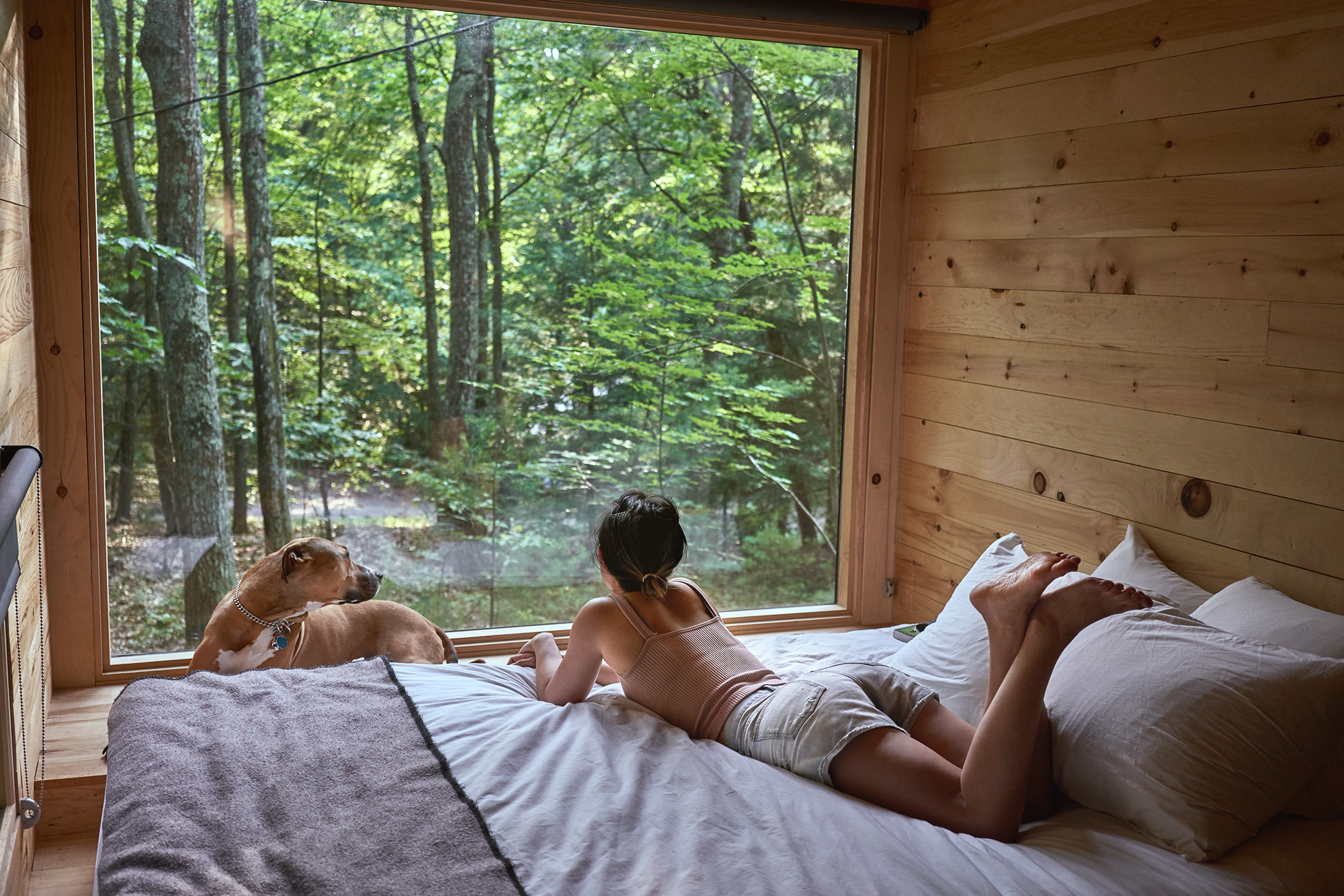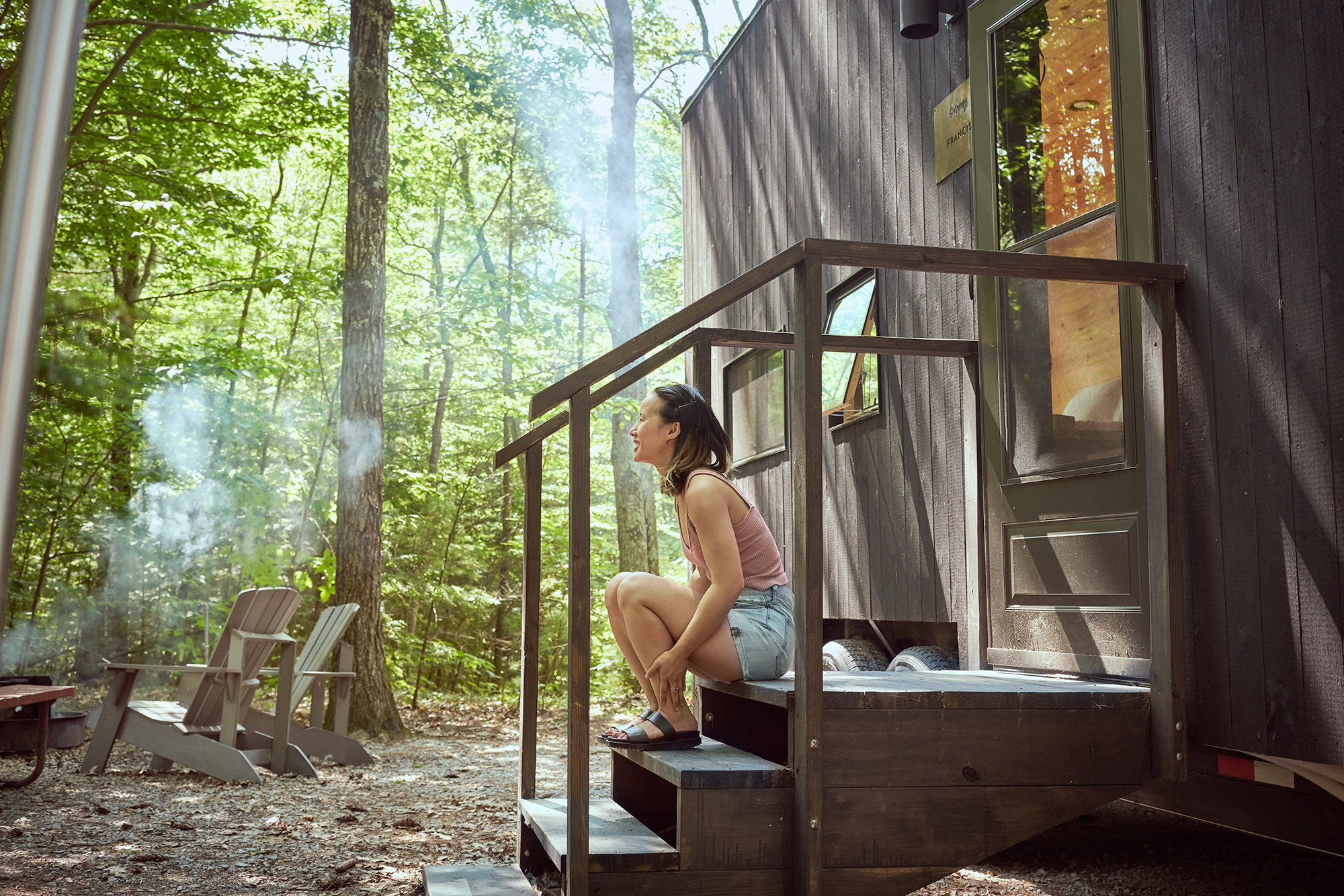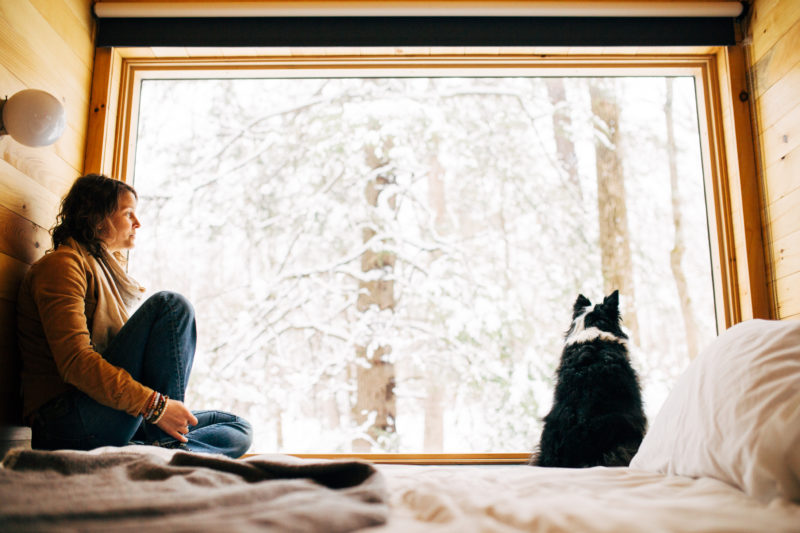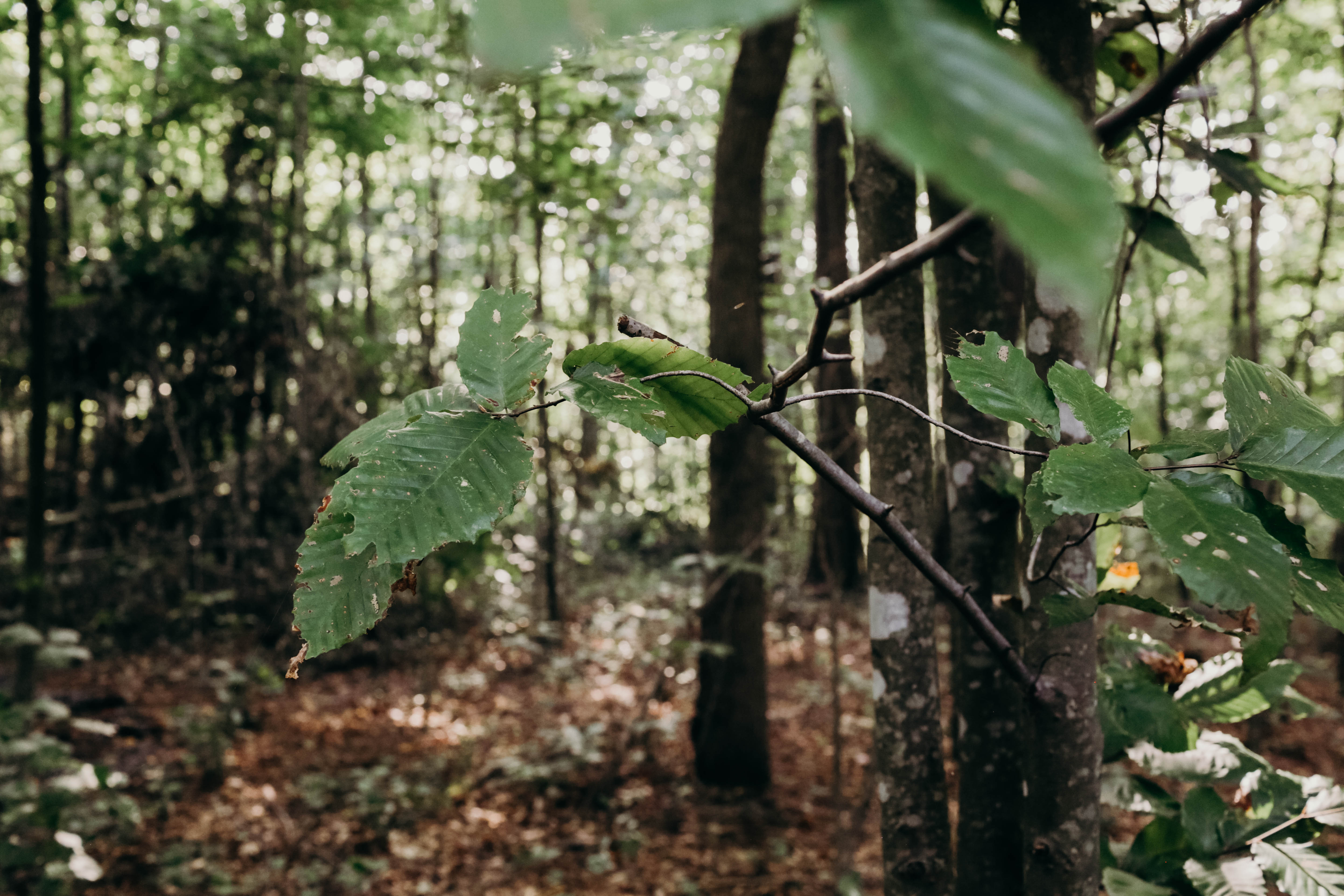In our busy lives, art is often sacrificed in favor of work. Our Artist Fellowship program was created to give artists space and time to create, uninterrupted. Enjoy this funny, touching, and sad essay by writer Raleigh McCool, a self-proclaimed ‘man of West Elm’ rather than a man of the woods, who describes his heart-breaking attempt to become bored (recommended by his therapist) and what happens when he faces himself, unmired by distractions.
My therapist’s only recommendation was to “get really bored.”
I grew up in a house where bored was a bad word.
“And as for me and my house, we will fill our lives with activities, so as to entertain ourselves and thereby avoid pain!” my father’s slogan might as well have been. This mantra served me well-ish; I learned how to dream, to invent, to play and entertain and have fun. Fun! Enjoyment! Pleasure! That is what it’s all about around here, right? To be bored — on purpose — felt counterintuitive, even wasteful, of the moment, of the opportunity to live, to YOLO diem. And yet, there’s this man to whom I pay fifty bucks a pop to talk to, and he told me to get bored, so: to boredom, we shall go!
That is what it’s all about around here, right? To be bored — on purpose — felt counterintuitive, even wasteful, of the moment, of the opportunity to live, to YOLO diem.
Ground zero for my boredom was a tiny cabin in the New Hampshire woods. How I came about planning to seclude myself in a penalty box-sized hut in New England was a response to my dissolving sense of self at the hands of a harried, frantic year of teaching middle school. Last summer, in an effort to celebrate the completion of my first harried, frantic year teaching middle school, I went on a robust West Coast road trip, hitting the high points and hot spots, during which I became exhausted after about two days of travel. I was overdosing on EXPERIENCES, while my body just wanted to rest. This time around, I aimed to do the exact opposite: from southwest to northeast; from big cities to a tiny cabin. I sensed that I needed solitude and quiet, to feel like myself again. My goals were to “figure out my life” (LOL), rest (cool!), and get some writing done.
I sensed that I needed solitude and quiet, to feel like myself again.
I can’t claim the Timberlakian “man of the woods” moniker, but I do love the outdoors. In fact, I am the man of the woods that I imagine JT himself to be: outdoorsy for what it does for him, for how it thrusts him into the heart of the world, and how the dope pictures one can take in nature turn out really well in all that natural light. The thing is, I also really value my own personal comfort: I sleep with a sleep mask, a noise maker, and a $100 pillow. I moisturize my skin thrice daily. If the temperature isn’t a precise 70, I won’t sleep a wink. When the sun goes down, I am less a man of the woods and more a man of the West Elm. It follows, then, that camping has not generally been my thing. Campfires are pretty and romantic, but I loathe the four-days-later stench of smoke that somehow seeps into my very red blood cells. Getaway seemed to be in sync with my own personal man of the woods cocktail: an Instagram-y interior, a shower, and AC, all plopped down in the middle of the remote Northeastern forest. A couple of months before school ended, I eagerly booked a three-night stay.
When the sun goes down, I am less a man of the woods and more a man of the West Elm.
The fear touched down the day before. At my therapist’s behest, I began to consider the possibility of boredom. Like, he actually encouraged me to schedule boredom:
11:00 am: Get really bored.
And, initially, it really sounded nice! I thought: I’ll allow myself to marvel at the trees and the sky and the rocks and nature and beauty. I’ll be amazed! I think I even fist-bumped my therapist on the way out, practically skipping, totally jazzed about my newfound approach to life, this embrace of boredom, my yet-to-come but inevitable enlightenment that would merely cost the price of briefly consenting to boredom.
I wondered — literally, for the first time — if there wasn’t something a little more sinister behind my family’s insistence on not being bored.
I was scheduled to fly to Boston, where my brother and sister-in-law live, from which I’d drive up to Epsom, New Hampshire. The day before my flight is when I realized it: Oh, crap. My body, my boredom, my therapist, my enlightenment: they all had something else in mind for this alone time. I was going to have to, I was just now realizing, deal with my shit. Humongous, cascading avalanches of shit. At this point, I was becoming less enthused about the boredom. I wondered — literally, for the first time — if there wasn’t something a little more sinister behind my family’s insistence on not being bored. Were our efforts simply to avoid any unpleasant emotions that might arise, should we give them a moment of quiet in which to speak up? I realized I’d be going into the deep quiet, the utter silence, the total loneliness. The boredom monster was coming for me.
Epsom is two hours, thereabouts, from Boston, and about 25 minutes east of Concord, the New Hampshire state capital. I drove to the cabin site, on land that felt like a former campground, little plots sequestered away on which they’d parked their tiny cabins, and dropped off my things. I was, it seemed, the only human who’d chosen to get away that day. This did not breed total confidence, as I was hoping at least to endure my own psychic boredom-torture with the comfort that other humans were out here, somewhere in these woods, with me.
I arrived around 6 PM., still daytime, but the sky was overcast on and off, and the cabin was so deep in the thick woods that I had the super dope recessed lights illuminating the inside as I set up my things and cooked myself a meal of roasted veggies and chickpeas. I cooked and ate and cleaned, with the whole process taking about an hour. In a subconscious delay of the boredom, I cleaned the lovely pots and pans Getaway provided, scrubbed the exquisite stove top on which I’d cooked, stored my leftovers just right in the mini-fridge. I arranged my clean dishes in so precise a way as to maintain perfect spatial harmony, to prevent any tiny fragment of my brain from latching onto the inaccuracy or the inconsistency or anything’s out-of-place-ness. As I obsessively arranged, as I feebly, vainly, and hilariously “protected” myself — I felt it rising up: not boredom, but pain. I thought of my ex-girlfriend, recently my ex-girlfriend, only a couple weeks prior. I missed her, I could tell, in some deep part of myself I wasn’t all the way aware of, as I rearranged the knives and spoons.
When I had arranged and disarranged and rearranged all of the cutlery nineteen dozen times, I said screw it, and stepped outside. There was a light drizzle, but I had a rain jacket and the tree covering caught a lot of it, and I was out there, really out there, in the freaking woods, and I guessed it truly did not matter one whopping cent whether I was wet or not, and so I walked out into the woods and looked out at the creek below me, my own personal creek, it seemed, as all the other plots of land appeared to be punted haphazardly into the Epsom woods, surrounded by trees, while my cabin backed up to its very own — my very own — boulder-strewn creek, a creek that seemed to sing in the evening rain. In the tiniest way — acquiescing to standing in the rain — I gave into the first greeting of boredom.
I cried out loud for the multiple shoulder surgeries I’ve had, for the constant pain and worry and fear and doubt in my body, and I cried for my breakup, for the loss of such a dear partner and companion and friend, for how lonely I felt right then, deeply lonely and sad,
I thought of an article I’d read on the plane the night before — in a GQ profile of Sarah Silverman, the writer recalled a story in which a Twitter troll called Silverman some awful name, to which Silverman profoundly replied, “You’re in a lot of pain.” That line had stuck with me — “You’re in a lot of pain.” I thought it was such a beautiful response. I let that line run across the ticker of my brain — “You’re in a lot of pain.” But I let a lot of lines run across the ticker of my brain. So I let it move to the forefront of my focus — I think I even said it out loud: “You’re in a lot of pain.” This whole boredom-induced thought progression took less than ten seconds. “You’re in a lot of pain,” I said, out loud. And there, in those woods, standing there in the rain, I lost it. I wept like I haven’t cried in twenty years. I sniffled and blubbered and whimpered — I am in so much pain. I mourned, out loud, and by this time another couple had gotten away to the cabin adjacent to mine, through the woods, but the rain was loud and there we were, in the woods in Epsom, New Hampshire, and I was in pain, and I cried out loud for the multiple shoulder surgeries I’ve had, for the constant pain and worry and fear and doubt in my body, and I cried for my breakup, for the loss of such a dear partner and companion and friend, for how lonely I felt right then, deeply lonely and sad, and I cried for the fact that I’d poured my heart and soul and energies into a teaching career that has, at every turn, beaten my spirit down to a husk, a career to which I’d brought such hope and joy and love and had received deep deprivation, insult, and shame, a career I’d be leaving in pursuit of nothing very clear, and I mourned for all of that, for the shame I felt at saying I am going to do a thing! And then being unsuccessful or unfulfilled by that thing and so then feeling like I had to announce I am no longer doing the thing! And the subsequent shame of being a 31-year-old man that can often feel like I ought to have made a mark, or at least some money, by now.
I cried for thirty minutes, there, in the rain. Before the trip, whenever anyone would ask me, “How you doin’? I would kind of shrug and say, “I don’t know!” I’d say I didn’t feel like myself, that something felt off. I certainly wasn’t hoping to feel the deep and utter despair and hurt that rained down in the actually-hilarious first five minutes of silence I allowed myself, but I think I was unknowingly getting at something: I hadn’t felt like myself in years. I hadn’t let myself feel in years. I guess I had some vague sense of “myself,” that in there was a human who was capable of and who should perhaps be experiencing the fullness — including (especially?) the pain — of living, but had been living a shallow, ankle-deep existence.
I gave myself to boredom the rest of the time. I felt lonely. But also, for the first time in forever, truly happy.
Raleigh McCool is a writer, storyteller, and teacher-at-heart in Nashville. He writes about sports, music, and religion. He enjoys listening to Mitski and Lorde, and getting away to middle Tennessee’s quite awesome parks. To learn more about our Artist Fellowship program, click here.




